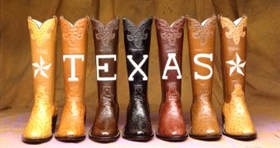05/28/01
It's
THIS (holding arms out) BIG!...
On Saturday of this lovely and extended weekend, I stepped for the first time into the Bob Bullock Texas State History Museum. The museum was being built just North of downtown Austin for a while now. It finally opened last month. Since then, I'd been hearing nothing but good things about it, more good things in fact, than I'd heard about Pearl Harbor. So instead of trying to see that movie, I went to the museum.
The museum as you might have guessed from the name, is entirely devoted to the history of Texas: The myths, the sacrifices and the big hair. (I'm waiting for an exhibit exclusively devoted to Dallas women.) The thing about Texas that you'll notice is that Texans love to talk about their state. Take a look at online journals from Texas. How many of us say glowing things about where we live? How many journalers who've moved out of Texas tend to write about how different their new environment is from their old comfy home in Texas?
 The second from the right is mine. |
We love us some Texas.
Which is an odd phenomenon to cross an entire huge state like ours because it's so geographically diverse. There's also a lot of different vibes in the state. Go to Austin and you'll find a laid back, but sometimes frustratingly slack city of dreamers. Go to San Antonio and you'll find a huge Hispanic population and a city that feeds on tourism while it nurtures a vibrant, musical cityscape. Go to Dallas and you'll be able to park a rich person's car for a generous tip. Go to West Texas and there might be a rope waiting for you.
Okay,
so I exaggerate.
The museum also takes pains to promote the cultural diversity of Texas. History has been rewritten: Mexicans who were led by Santa Anna are no longer evil, dirty bastards who took the Alamo from freedom-lovin' pioneers. It seems the Alamo was just a big misunderstanding involving lots of muskets and death. So, the Mexican army, it turns out are just misunderstood bastards. And they were dirty.
There was also a groovy 20-minute interactive movie with great special effects (lightning, a snake in your seat -- trust me, it was cool) and an IMAX showing of a movie about caverns. I'm not sure what the underground caverns being explored for organism samples in the African rain forest had to do with Texas history, but we now have an IMAX theater in town and I'm not going to complain about that.
The museum reinforced several truisms about Texas:
It's big.
Real big.
We like that it's big.
Davey Crockett was king of the wild frontier
Hollywood sure is funny about how they portray cowboys in them thar picture shows.
Oh yeah, there were women Texans, too.
And Tejanos!
Did you know Buddy Holly was from Texas?
And The Big Bopper?
But not Rickie Valens
Did I mention that Texas sure is big?
I wish I could link to it for you (can't find it in any archives), but Hank Stuever, one of my favorite writers of any medium (he currently writes for The Washington Post's style section), did a great piece that ran in the Austin paper about the myth of Texas.
His conclusion, from having lived here for several years, is that Texans aren't really in love with Texas -- they're in love with the idea of Texas, a beautiful James Dean-starring vista of endless sunsets, seas of bluebonnets and bursting oil fields. That this place doesn't exist (Hell, even the old cowboy movies were shot in Arizona and New Mexico, making Texas appear to be a southwest desert) is a foregone conclusion. But did it ever exist? Where did the myth come from? What exactly is it we're so proud of?
The state museum is beautiful. Really. It's been lovingly crafted by people who clearly adore the place, from the panhandle to the Rio Grande Valley. The films are entertaining, the exhibits are thorough and far from boring. But in the hours I spent there, I left with more questions about this mythical place where I live than when I'd arrived. Texas, in its history and in its excess, is still a mystery.
Her magnetic pull is no clearer to me than when I went away for years and made my inevitable return, like a lost child finding his way home.
 |
|||||||
 |
 |
||||||
 |
|||||||
 |
|||||||
 |
|||||||
 |
|||||||
 |
|||||||
Clip
Art Corner

"Oh, jeez, Bessie, would you just take the picture already?"